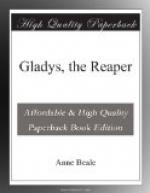As Freda foretold, bells rang, bonfires blazed, and cannons fired, when the respective owners of Glanyravon and Abertewey brought home their respective brides, which took place in due course. If anybody thought of Miss Gwynne, it was to comment loudly on her conduct in leaving her home, because her father chose to marry again, and lowering herself and her position by going to reside with her former governess, the wife of a curate in the East End of London. Some few sympathised with her, but the greater number laughed at Mr Gwynne, admired Lady Nugent’s tact, and blamed Freda.
Those, also, who discussed Colonel Vaughan, as everybody did, thought him a wise man to marry a woman who could at once clear his estate, and enable him to live upon it as his fathers had never lived before him, and welcomed him home with great ardour, and a regular volley of dinner parties.
Thus Lady Mary Nugent and her daughter, with their various worldly and external advantages, and Colonel Vaughan, with his savoir faire, had done more for themselves than Freda or Gladys, or Owen or Rowland could have done, with their honesty of purpose, beauty, and intelligence, in a worldly point of view, I would be understood to mean.
CHAPTER XXXVII.
THE SPENDTHRIFT.
We must now run rapidly through the next six years of Howel and Netta’s career.
After spending nearly a year abroad, where Howel amused himself, in addition, to his usual diversions, by speculating in some German mines, they came back to England. They went for a time to Spendall Lodge in Yorkshire, on a visit to Sir Samuel Spendall, in order to be in the vicinity of the Doncaster races. Thence they went to Scarborough, where Howel left Netta, her child and maid in a lodging, whilst he attended the various races in other parts of the country.
About this time, Sir John Simpson died, and his son came into his fortune. Howel immediately bought a handsome house in Belgravia, furnished it expensively, and began life as a London fine gentleman.
It is needless to describe how Howel’s income and position in society gradually dwindled down; or more properly, how his means fluctuated according as his horses lost or won, or his various speculations succeeded or failed. Long before his father died, he had mortgaged that father’s very mortgages; and had spent a large portion of his wealth in paying off debts of honour, and freeing himself from the Jews, into whose hands he had got before he went to live at Abertewey.
During his four years’ residence in London, it was evident that his means fluctuated in some wonderful way. His house was the rendezvous of men of all ranks who were on the turf, and his life was passed in a state of perpetual excitement. Netta did not see much of him, except at their own table, or that of their acquaintances. When she was alone with him, he was either quite silent, or abusive;




